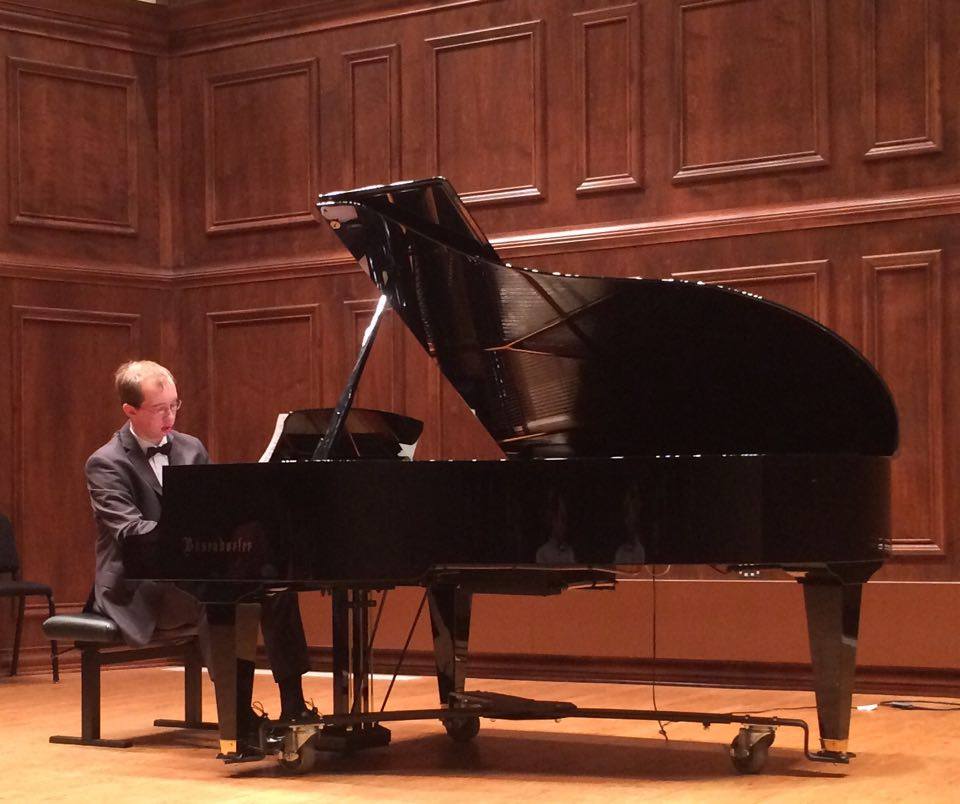
At 7:40 p.m. on a Saturday, junior Thomas Ryskamp was sitting in his bedroom when he got a phone call from a singer in distress. It was the fall of 2017, the evening of Sigma Alpha Iota’s concert, and junior Shiloh Carozza had no one to play piano alongside her. Things hadn’t worked out with her original accompanist, and after fruitlessly searching the music building for help, she called Ryskamp.
“When he answered, I literally asked him, ‘Can you save my life?’ to which he replied, ‘Well, it would depend on what that entails,’” Carozza said. “He arrived at Howard from Simpson in shorts and a T-shirt, ran through the piece with me once beforehand, and then got up to perform it about fifteen minutes later. To this day, he insists that he was not sight reading, but considering that it was 20 minutes before the concert, I think that counts.”
Ryskamp said he asked Carozza if she wanted him to change clothes, but she said no. He adds, “And also, for the record, I had seen the song before, so I was not sight-reading.”
Among both students and faculty, Ryskamp has developed a reputation on campus for his dependability and skill on the piano. An accounting and music double major, Ryskamp says he’s considering studying accompaniment in graduate school. But for now, he’s busy performing at the college, both accompanying and performing solo.
“One of Tom’s strengths is his ability to learn music quickly,” Teacher of Music Brad Blackham, Ryskamp’s piano teacher, said. “He’s a strong sight-reader and he has a terrific ear, including perfect pitch or relative perfect pitch — I’ve never come out and asked him which it is though. So he’s been an asset to our department as an accompanist because of his quick learning.”
When asked, Ryskamp said he does have perfect pitch, a coveted talent among musicians that allows them to recognize or produce any musical note.
Ryskamp will continue to share his skills with a solo performance of the first movement of Beethoven’s “Piano Concerto No. 4 in G Major, Op. 58” during the orchestra concert May 10. He chose the 20-minute piano solo to audition for the annual concerto competition because he liked the way the piano and orchestra play both together and separately — and he gets to “show off” a bit.
“The piano and orchestra really take turns, and the piano has to be a lot more sensitive,” Ryskamp said. “The concerto is my time to shine. The only time you shine as an accompanist is if the performer messes up and there’s someone in the audience who knows the music, realizes that the performer messed up, and notices that the accompanist caught them right away. It’s our job not to be noticed.”
Ryskamp said he doesn’t mind the lack of recognition that comes from playing music as a backdrop, and he prefers accompaniment because it’s more of a challenge.
“I think I like accompaniment more, and not just singers, but also instrumentalists,” Ryskamp said. “It gives the added challenge of balancing your sound with theirs and sounding good as a group. And it gives a variety of sound that you don’t get from just the piano.”
Many of the students Ryskamp accompanies are voice students of Lecturer in Music Karl Schmidt, who said Ryskamp has incredible keyboard and sight-reading skills.
“To put it simply, Tom Ryskamp is one of the best pianists I have ever worked with,” Schmidt said. “He can accompany classical and musical theater with equal facility. And on top of all this, he is not only wonderfully gifted and hardworking, but a joy to work with.”
After practicing his concerto for three-quarters of a year, Ryskamp said he looks forward to performing in a full Markel Auditorium at the orchestra concert.
“It’s so great to be able to play with the Hillsdale orchestra because they learn so fast and they play so well. And they adjust so quickly too. It’s just a great experience,” Ryskamp said. He added, stretching his long fingers into the “okay” sign to signify approval, “And also, the Steinway piano that I’ll be playing on is incredible.”

